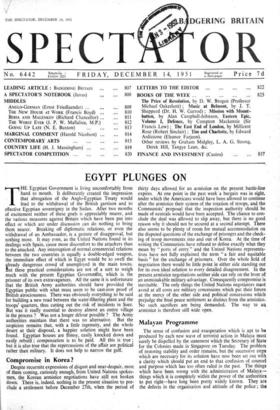Compromise in Korea? .
Despite recurrent expressions of disgust and near-despair, most of them coming, curiously enough, from United Nations spokes- men, the Korean armistice negotiations have still not broken down. There is, indeed, nothing in the present situation to pre dude a settlement before December 27th, when the period of thirty days allowed for an armistice on the present battle-line expires. At one point in the past week a bargain was in sight. under which the Americans would have been allowed to continue after the armistice their system of the rotation of troops, and the Communists' proposal that the inspection authority should be made of neutrals would have been accepted. The chance to con- clude the deal was allowed to slip away, but there is no good reason why it should not be secured at a second attempt. There also seems to be plenty of room for mutual accommodation on the disputed questions of the exchange of prisongs and the check- ing of troop movements into and out of Korea. At the time of writing the Communists have refused to define exactly what they mean by "ports of entry" and the United Nations representa- tives have not fully explained the term "a fair and equitable basis" for the exchange of prisoners. Over the whole field of negotiation there would be little point in either side standing out for its own ideal solution to every detailed disagreement. In the present armistice negotiations neither side can rely on the lever of an unmistakable military advantage. Consequently compromise is inevitable. The only things the United Nations negotiators must avoid at all costs are military concessions which put their forces at the mercy of the other side and political concessions which prejudge the final peace settlement as distinct from the armistice. No such sacrifices are being demanded. The way to an, armistice is therefore still wide open.






































